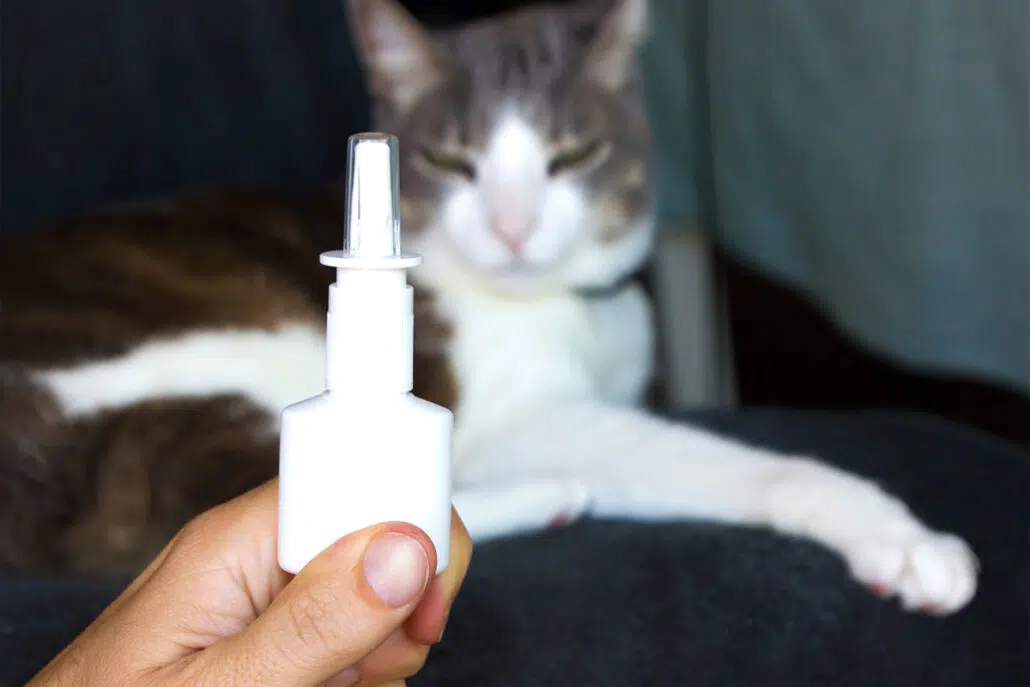Pet allergies are a common condition that impacts 10 to 20% of the global population. Typically, these allergies are triggered by proteins present in pets’ saliva, urine, or dander. Symptoms can vary from mild, such as sneezing and nasal congestion, to severe, encompassing skin rashes and difficulties breathing.
One of the most effective ways to manage pet allergies is through the use of pet allergy sprays. This article will dive into the science behind these sprays, their benefits, and how to choose the right one for your needs.

The Role of Sprays in Allergy Management
Pet allergy sprays are vital for managing allergies, especially for those with dog and cat allergies or other pet-related allergic conditions. These sprays, applied to the pet’s fur or living environment, can lessen airborne allergens and reduce allergy symptoms like chest tightness or shortness of breath. In pet-friendly homes, allergen sprays are key to maintaining a clean, allergen-free space.
The Science Behind Pet Allergy Sprays
The science behind pet allergy sprays is grounded in their ability to neutralize pet allergens that commonly trigger allergy symptoms in sensitive individuals. These sprays are designed to alleviate the allergic responses caused by proteins found in pet dander, a primary environmental allergy trigger.
How Sprays Combat Pet Dander
Pet dander, tiny dead skin cells from animals, often triggers an allergic reaction. Sprays combat pet dander by deploying a mix of ingredients that either neutralize the allergen on contact or create a barrier that reduces the likelihood of the dander becoming airborne. With regular use, these products can minimize pet dander levels in the home environment.
Ingredients in Pet Allergy Sprays
Ingredients in pet allergy sprays typically include a blend of safe, non-toxic substances designed to deactivate the allergenic proteins in pet dander. Some may contain substances that act as an allergy blocker spray, creating a barrier to prevent pet allergens from becoming airborne.
Types of Pet Allergy Sprays
Navigating the vast array of pet allergy sprays can be overwhelming for pet owners seeking allergy relief from cat allergies, environmental allergies, or other pet allergens. Here’s a concise classification to help:
- Allergen Blocker Sprays: These sprays minimize the symptoms of allergies by creating a barrier that blocks pet allergens from entering nasal passages.
- Anti-Dander Sprays: Specially formulated to reduce pet dander on contact, these sprays neutralize the protein that causes allergic responses in pet lovers with allergies.
- Airborne Allergen Neutralizers: Designed to tackle airborne allergens, these products improve air quality by reducing allergen levels from fur and dander.
- Deodorizing Allergy Sprays: These combat urine odor and other pet smells that can worsen allergy symptoms, enhancing the environment for those experiencing allergy symptoms.
- Natural Allergy Relief Sprays: These sprays contain natural ingredients and provide allergy relief without the use of traditional allergy medicine, offering a holistic approach to managing pet allergies.
The Importance of Pet Allergy Sprays
Pet allergy sprays are an essential tool in the management of pet allergies. They provide a practical and effective solution to neutralize pet allergens in your environment, helping to create a more comfortable living space for individuals with pet allergies.
Benefits of Using Allergy Sprays
Allergy sprays are a convenient and effective pet allergy treatment that can provide allergy symptom relief. Frequently bathing a pet might provide similar results, but this is very time-consuming and can dry out your pet’s skin. Unlike frequent bathing, the allergy blocker spray is a simple addition to a routine. Most have a pleasant or neutral fragrance and also condition your pet’s skin and fur.
Most importantly, they can significantly decrease contact with trigger allergens, providing relief from allergy symptoms.
Comparing Sprays to Other Allergy Treatments
Pet allergy sprays, unlike allergy shots and sublingual immunotherapy allergy tablets, neutralize allergens directly in the environment, providing immediate allergy symptom relief. They are also more convenient, as they don’t require a significant time commitment or invasive procedures.
How to Choose the Right Pet Allergy Spray
Choosing the right pet allergy spray is crucial to effectively managing your pet allergies. Here are a few factors to consider:
- Pet Type: Some sprays are designed specifically for dogs, while others are meant for cats and other pets. Choose a spray that is suitable for your pet type for maximum effectiveness.
- Ingredients: Look for sprays designed to neutralize allergens on contact. Avoid products that contain harmful or harsh ingredients or those that may irritate your pet.
- Application: Consider how the spray is to be applied. Some sprays are meant for use on the pet’s coat, while others are designed for use on surfaces and fabrics. Choose a product that suits your specific needs. Most are not meant to be sprayed directly on your pet but applied with a cloth instead.
- Frequency of Use: Some products are meant to be used every other week, while others should be applied every few days. Consider your lifestyle and how frequently you can realistically apply the spray.
Using Pet Allergy Sprays Effectively
Here are some general guidelines to help you use these sprays effectively:
- Apply Regularly: Apply the spray according to the instructions. Timely application ensures that allergens are consistently neutralized.
- Cover All Areas: Spray on surfaces where your pet spends most of their time, such as their bed, your furniture, and carpets. Some sprays can also be applied directly to the pet’s coat, while others can’t.
- Avoid Sensitive Areas: When applying the spray directly to your pet, avoid sensitive areas such as the eyes and mouth. If the product irritates your pet, discontinue use and consult your vet.
- Test on Fabrics: If you’re using the spray on furniture or clothing, do a spot test first to ensure it doesn’t cause discoloration.

The Impact of Pet Allergy Sprays on Daily Life
Sprays for pet allergies can lessen symptoms like sneezing, coughing, itchy eyes, and skin rashes. This means fewer disruptions to your daily routine and more enjoyable interactions with your furry friend.
Combining Pet Allergy Sprays with Other Treatments
While pet allergy sprays can be highly effective, they are often most beneficial when used in combination with other allergy management strategies. These may include:
- Regular Cleaning: Regular vacuuming and dusting can help reduce allergen levels in your home. A high-efficiency vacuum cleaner and dusting tools can capture more allergens and prevent them from becoming airborne.
- Air Filters: High-efficiency particulate air (HEPA) filters can remove allergens from the air, further reducing allergen exposure.
- Allergy Medicine: Over-the-counter or prescription allergy medication and nasal sprays can help manage symptoms. Always talk to a healthcare provider before beginning any new medication.
- Pet-Free Zones: Designating certain areas of your home as pet-free can provide a safe space where pet dander exposure is minimized.
- See an Expert: Make an appointment with an allergist for testing to be sure that dander is causing your allergic response.
Conclusion: Embracing a Dander-Free Lifestyle
By neutralizing allergens on contact, these sprays can reduce the severity of allergy symptoms and improve your quality of life.
When used along with other allergy management strategies, they can help you embrace a dander-free lifestyle, making your home a more comfortable place for everyone. With the right tools and strategies, you can enjoy the companionship of your pet without compromising your health.
The experts at Penn Medicine Becker ENT and Allergy in New Jersey and Pennsylvania can give you a thorough examination and suggest the proper treatment to combat your allergies. Request an appointment today.

